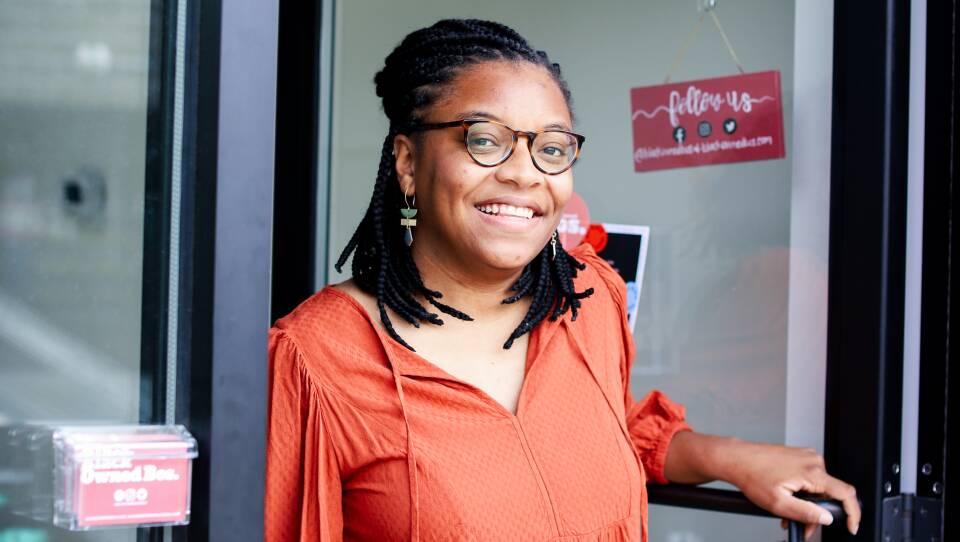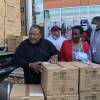For Roxbury resident Jae'da Turner, the holiday season doesn’t begin the day after Thanksgiving, or the night Mariah Carey’s Christmas anthem makes it’s inevitable leap back onto the charts. It’s at the front of her mind all year — especially when it comes to small businesses. Turner, the founder and managing director of Black Owned Bos — a consulting agency and directory that platforms Black-owned businesses throughout the region — knows that entrepreneurs need to prepare long before the air grows cold.
To help small business owners this year, she is piloting the Holiday Bos Shop, which features about 30 brands under the roof of one boutique in Back Bay. It opens on Black Friday and will run through Dec. 24. “What better way to pilot it during the holiday season, where people are shopping the most, to test out this concept and potentially carry this forward kind of on a permanent basis?” Turner said.
Black Owned Bos is not a physical place, a storefront with a permanent fixture that you waltz into. Rather, it is a digital directory that also transits into the real world through projects like the holiday shop, infusing its spiritual essence with a corporeal form (insofar as brick-and-mortar constitutes “corporeal”).
It is still a young platform. Turner traces its origins to an Instagram profile a friend shared with her; one that featured two friends exploring the New York City borough of Brooklyn via its small-business ecosystem. And while she isn’t what you’d call an influencer or blogger in a traditional sense, she’s found a way to make her mark on the local business scene.Turner’s has an intense love for her native Boston, had her asking: “How can I create a platform to highlight a lot of the businesses that I patronize myself?”
And so a kind of capitalistic symbiosis emerged. In this relationship, a business would be introduced to a new audience or customer base on social media. But with each additional business listed on the directory, the platform continues to grow into a digital space that, according to Turner, “can create kind of that sense of mainstream pop culture around, Black-owned businesses, connecting them with a larger community.”
Black Owned Bos was growing steadily in spring 2019. But then came 2020 and a readjustment of expectations and social interactions. As the pandemic raged, Turner noticed a discrepancy between major players and small businesses. While consumers could enter a big box store and browse apparel and other nonessential items, small businesses limited their hours or closed, and farmers’ markets were regularly getting canceled. So she began to explore the prospects of an outdoor market to showcase businesses and their goods, in a controlled way, in accordance with the interests of public health.
That first pandemic year was also marked by widespread civil unrest and protest, in which a justifiably raging Black underclass was suddenly joined in the streets, to some extent, by an ostensibly well-meaning white America. But as suddenly as that enthusiasm appeared, it dissipated. While it came as a shock to some it was almost expected by others, Turner included. And that anticipation affected the roll out of her project. In the weeks after the murder of George Floyd, her page grew from 3,000 to more than 10,000 followers, and it’s not difficult to see how — people wanted to contribute to the movement, and, as Turner put it “what better way do people have agency than over where they put their dollars?” As demand increased for a more formal directory of Black-owned business, Turner was careful to not rush anything to the public.
“I knew that that moment would be fleeting in some ways,” she said. Rather than reacting to the demands of an arguably “performatively woke” moment, she put out something that could last beyond the zeitgeist. “I wanted to put out a list in a fashion that made sense,” she recalled. “Not to rush something just because people were asking for it.”
While Black Owned Bos largely operates in the digital space, the holiday shop is not its first foray onto the streets. Top of mind is the Bow Market Incubator, a four-week program where Black Owned Bos coaches a small business around setting up shop in a physical location — remember, running a business online and doing so in a place are different managerial experiences. The cornerstone of the incubation project is a pop-up shop. There are also private marketplaces, where a business will represent itself at a private event (on the day I interviewed Turner for this story, she had recently completed an employee holiday marketplace hosted at the office of an individual who visited a Black Owned Bos event and reached out for a private service).
As the holidays bear down on our wallets and diets and general dispositions, so do conversations about the supply chain. Such discussions are unavoidable for Turner, given the long-term planning that goes into holiday sales. While consumers may have a general idea about how supply chain issues could work for a major retailer, and recognize that supply chain problems can greatly impact small business, questions may remain exactly about how they affect the latter. Turner said to imagine a small company that sells body butter. Imagine that you use a particular container to package it, and that each of those containers has a specific label that fits it. This is the public-facing product — visible in marketing photography, for example — and the goods that customers would expect. But at this point, suppliers might prioritize companies buying containers in bulk, and if you aren’t ponying up for 10,000 containers up front, then you’re at the end of the line. And even if you could make that purchase, many small businesses are run out of the home, which introduces storage complications. Now, you have to switch to a different container than what customers expect, and that creates a customer service issue.
Despite these complications, Turner still sees her project as important to the economic health of Black America, and one that has potential to help close the racial wealth gap. “Creating space for people to make connections outside of their immediate community is super powerful,” she said, “because once you go into these commercial districts with your products … it opens up opportunities.”








